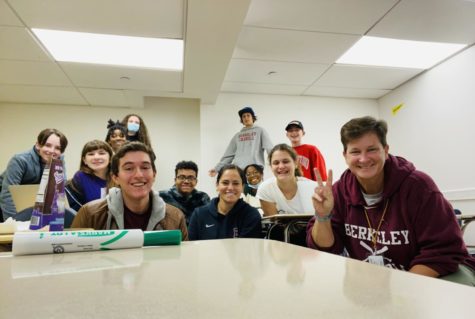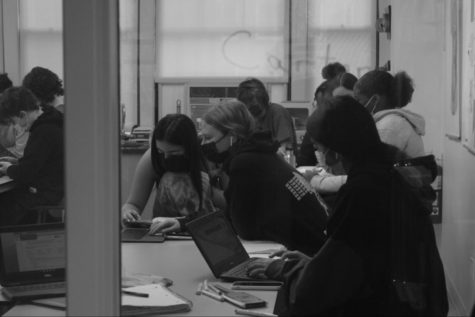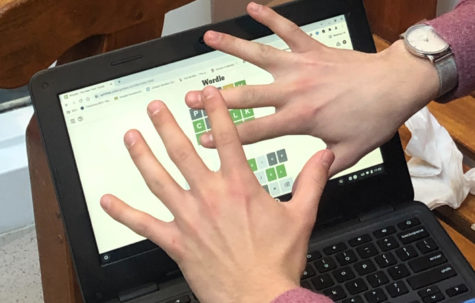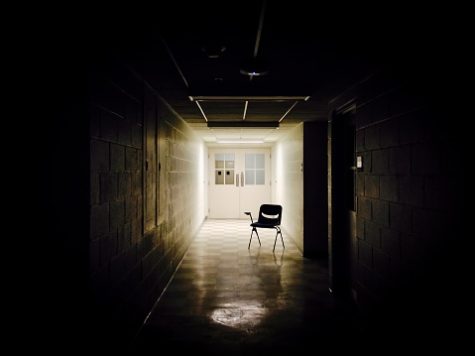It’s Not You, It’s Me: Stress and Anxiety for Students Due to School Work

My name is Asa Khalid and I’m a 9th grader who’s new to Berkeley Carroll and private schools in general. One thing I am not new to, however, is copious amounts of school work. Whether it’s a lot of homework, random projects that are due the next day, or pop quizzes in class, for students, school can be really stressful. Now, add the anxiety of being in a private school, surrounded by people who are nothing like you, and students who learned way more and more in-depth than you ever did. Oh, and don’t forget to count in teachers that expect the most because all the other students learned the most.
So far, I haven’t had any huge mental breakdowns, but I can feel one nagging on my shoulder and tugging on my hair like a deeper-voiced and somehow more obnoxious version of a toddler. A demon toddler, one could say. It pinches my ear and whispers, “Maybe if you cry, Ms. Sefchovich won’t assign another chapter in the textbook” or “If you put your head on your book and cover your face with your arm, no one will know that you’re crying instead of reading the Odyssey” and even sometimes, “Will Dr. Holsberg make you guys stop playing Bolero if you scream cry and tear your hair out at the same time?” I haven’t actually gathered up the courage to do any of these, but I have been so close that it’s not even funny. And this goes for all of my classes. It’s definitely not the teachers. It’s more of, I’m an extreme procrastinator and I act surprised when I see I’m failing all of my classes.
Now, this isn’t the case for anyone. During my so far limited time at this school, I’ve realized the majority of the kids here take their education VERY seriously. Every day on Snapchat, when I go through my friends’ stories, I see at least one kid from BC that has made a Quizlet on the next Bio quiz that’s coming up. It’s inspiring enough for me to get up and look at the review packet for Geometry for a couple minutes, but not inspiring enough for me to actually do it, unfortunately.
And despite the fact that the students here work hard, mental breakdowns work harder. I can’t even tell you how many friends of mine have started crying—whether it’s in school or out of school—about the amount of work that they haven’t finished or how little they’ve studied for any upcoming Mandarin quiz. And when I see this, I first get confused because nobody said that studying was mandatory, and second, I feel bad because I’m not nearly as stressed as them, and most times, I forget we even had a quiz.
I figured that there had to be something wrong. How are my more studious peers more stressed than me? Is it really too much school work, or am I just lazy? Much more questions popped into my head. And I know, that as a student, I can’t accurately describe the struggle of every single student in my grade, much less the whole school. So I decided to interview my English teacher Mr. Sanchez, and the school psychologist, Dr. Kauffmann.
I asked them both the same questions and in some ways, they responded similarly, and in other ways, they responded differently, which I found really interesting. One specific response from Mr. Sanchez that I found thought-provoking was when he said, “If someone has anxiety they have to own that. It doesn’t belong to other people. They have to look at those things and beware of who they are. For example, if I’m in a bad mood, I need to be aware of that so I don’t treat people with a bad filter. Students have to value how they are internally. They have to value how they feel about themselves and others.” He continued, “ What people do with their anxiety is important. If someone is promoting it and not dealing with it themselves and just talking about, [it] creates a more anxious environment. Just like everything else in America. If it runs on fear it gets more momentum.”
I found this part of the interview the most fascinating it answered the question I had in the first place. How are my more studious peers more stressed out than me? It’s because the more people think—about anything really—the more they can find wrong with it, or the more they can find to worry about. Obviously, my more studious friends are more stressed out because they think about their work and grades more. But while I’m not as stressed out, but my grades aren’t as good as they could be. So where is that balanced reached? And whose duty is it to achieve that balance? The student, the teacher, or both?
One of the other questions I asked was about learning type and if students should be placed in different classes based on how they learn. This question especially applies to me because my learning type is multimodal, meaning I use several different ways to learn which can be stressful for studying because I need to use all the different ways I learn to study or else I don’t understand it at all. Therefore, most times I don’t bother to study because that would be too time-consuming. And oftentimes, teachers teach for reading-writing learning types which can be difficult for students who learn visually.
So as you can see, I was really glad when Dr. Kauffmann answered this question so eloquently. She said, “ Most of us believe that we’re a certain type of learner. You can take the VARK test to see what kind of learner you are (visual, aural, read/write, kinesthetic), but it’s important to know that research doesn’t support the concept of different types of learners. The best thing to do is to figure out how YOU learn best but not necessarily in the four categories on the VARK test. Most solid learners take good notes, pay attention in class, make connections between what they’re learning and what they already know, review their class notes every day for a few minutes per class, do their homework for understanding and depth and not just to get it over with, go back to their notes a few days later and retrieve the same information which is good for retention, etc. The good thing about classes at BC is that they’re a mix of different types of teaching and learning.”
This type of response is important because a lot of times people get stuck in their ways because it’s so comfortable. It’s easy to just label people and pretend you know everything about them and who they are. Whether it’s as complicated as gender or as simple as learning types, the convenience of simply putting a stamp on someone’s head and telling them who they are is easy, but it is definitely more beneficial to let people be who they are, because the truth is, people don’t really fit into the binary. Like I previously stated, my learning type is multi-modal which means I learn in many different ways, which makes it difficult to exactly point out what is helpful and not helpful because I need a little bit of everything. This is true for most people. A lot of times you’ll find that the reason you’re not understanding a class as much as your peers is not that you’re dumb, but because the teacher doesn’t teach in a way that’s helpful to you, which isn’t the teacher’s fault. What Dr. Kauffmann is saying is that you have to figure out the way you study the best in order to learn most effectively.
But the main question I had—the question we all have—is what can we do to fix this, for a lack of a better word, stress epidemic? Mr. Sanchez’s response is, “Teaching students breathing exercise, time management, to teach students how to use their bodies to relieve stress with dance and teach students how to laugh and take risks comfortably. When I was a senior in high school, one day a week, I would leave my friends and sit in silence listening to music for half an hour during lunch. That being said, I’ve been far removed from being a teen, so I can’t imagine what it’s like to be a teen now. It much more difficult. There are more things to take you away from who you are. It’s just a different space.”
Dr. Kauffmann’s response was “Helpful solutions to decrease stress and anxiety include: limit all types of screen time; practice mindfulness (or just breathe and say the kind things to yourself that you would say to a friend in distress); eat well; sleep enough; exercise; have fun; help a friend, relative or neighbor; think about what you’re grateful for in your life before you go to sleep each night; stay organized and manage your time well; smile (it releases happy hormones); try to spend time in nature (even a 10-minute walk in a local park is helpful); do something that makes you happy, ASK FOR HELP if you’re not feeling good. From someone you know or a crisis line.”
Overall, the best advice on anxiety I ever received was, “Why are you so nervous?” Which sounds so unhelpful when other people are asking, but when you actually sit down and take the time in your brain to ask this question to yourself, you’re able to talk yourself down to realizing that what you were so worried about was only based on an assumption of an outcome and not the actual outcome.
These are the crisis resources Dr.Kauffmann recommends students visit/use for managing stress and anxiety:
Crisis Text Line (CTL) https://www.youtube.com/watch?v=4H6BL2KKfA0&authuser=0
TedTalk: https://www.ted.com/talks/nancy_lublin_the_heartbreaking_text_that_inspired_a_crisis_help_line
NYC Well: http://www1.nyc.gov/assets/olr/downloads/pdf/wellness/mentalhealth/nyc-well-fact-sheet.pdf
and
http://gothamist.com/2016/10/24/nyc_launches_247_mental_health_hotl.php
MHA-NYC recommends: https://mhaofnyc.org/ Click on “for immediate help.”









